Institutional Context
Summary
The University of Nottingham was founded on the vision and philanthropic spirit of Sir Jesse Boot. Our vision today is to change the world for the better, in line with our University Strategy, and fulfil our commitment to the UN Sustainable Development Goals. Our inspiring campuses in three countries energise us to be globally engaged while committed to making a difference in our cities and regions.
Over the past three years, we delivered knowledge exchange activity valued at £415.5m. We are ranked 18th in the UK by the QS World University Rankings 2023 and seventh for research power (REF 2021). Alongside Nottingham Trent University, we lead Universities for Nottingham, a pioneering collaboration combining the strength of Nottingham’s two world-class universities.
Institutional context
The exchange of ideas is core to our mission of changing the world for the better. Our KE activity is valued at £415.5m for the period (examples in fig1) and as a research-intensive university we embrace opportunities to maximise the impact of our innovation and enterprise to enable prosperous, secure and healthy societies. Our significant contribution to the local, regional and national economy is recognised by the Russell Group.
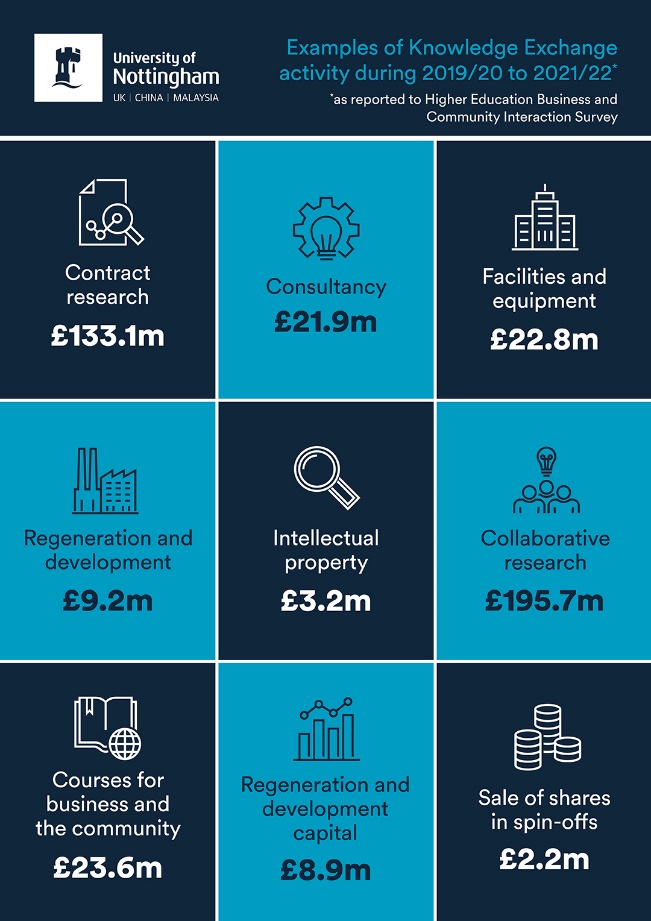
Figure 1
In 2019 an independent economic analysis by Public First found that we contribute £2.3bn to the UK economy, including £1.1bn for the D2N2 Local Enterprise Partnership (LEP) or £760m for the City of Nottingham. This is the equivalent of 2.5% of GVA of the local (D2N2 LEP) economic area.
In the High Growth Nottinghamshire report 2022, Beauhurst found that the university “plays a significant role in the high-growth ecosystem in Nottinghamshire, with the majority of spinouts (72.4%) stemming from it … The University of Nottingham Innovation Park is an attractive prospect for research-intensive companies’ headquarters”.
Our spinout portfolio, managed through our subsidiary Nottingham Technology Ventures, generates investment by taking our revolutionary innovations to market. For example, Cerca Magnetics commercialised the world’s first “wearable” magnetoencephalography (MEG) brain scanner. Developed at the birthplace of MRI, the system is set to once again transform medicine.
The University Invention Fund invested £3.9m between 2019 and 2022 in the spin-out portfolio, in turn attracting £196m, thus levering £15 from external investors for every £1 invested. The Beauhurst report stated: “We will continue to see ambitious, innovative companies spin-out of the University of Nottingham, reflecting its willingness to fund these companies and commercialise research. It’s reasonable to expect more of these companies to emerge... to continue to benefit from the University’s facilities and infrastructure.”. This activity is supported by a robust and vibrant approach to the protection and exploitation of our research through licensing and consultancy.
Our programmes support hundreds of businesses and enable them to respond to new opportunities. Our business incubators include University of Nottingham Innovation Park, BioCity (acquired by Trinity IM in 2021), and two Rolls-Royce University Technology Centres are among our strategic industry partnerships.
Our strong track record of industry engagement continued during the period, with new business partnerships including:
KPMG supporting economic growth in the East Midlands
Mitsubishi Chemicals decarbonising the UK Acrylics industry.
SMEs through our ERDF programmes, including the LEADD:NG project supporting adoption of immersive technology
Partnering with 570 firms (2020-21) on contract research projects including 136 SMEs - the highest number of any university.
Our KE strategic delivery is monitored by KE Committee, a committee of Senate. Our KE activity is supported by professional services teams in our Research and Innovation directorate, providing guidance across IP and commercialisation; business engagement; continued professional development; and local growth. Created in spring 2022, our KE Hub (fig2) provides resources for KE development and is used by 1,300 staff. Our Faculty KE teams, Institute for Policy and Engagement and Haydn Green Institute for Innovation and Entrepreneurship enhance this support.
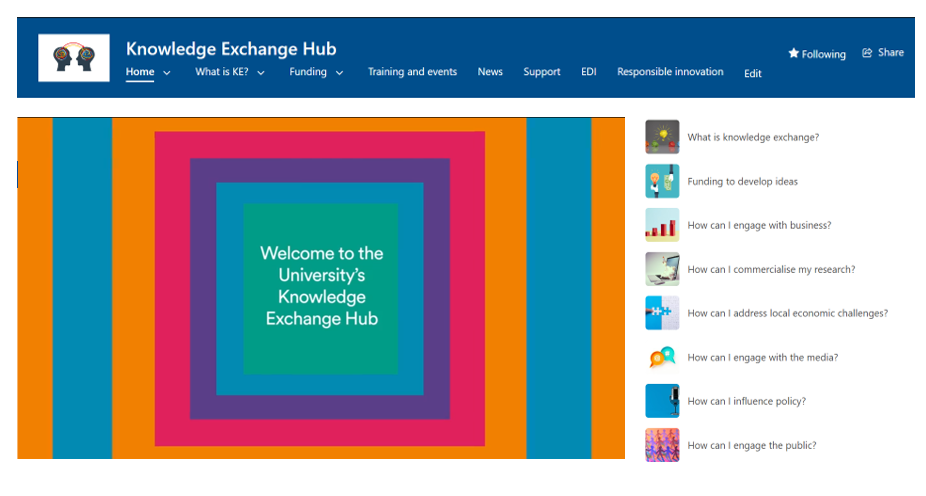
For further information, please send queries to research@nottingham.ac.uk
Local Growth and Regeneration
Summary of approach
The University of Nottingham (UoN) is an anchor institution for our city and region; our civic mission is embedded in our Research and Knowledge Exchange. We are a major employer and provider of skills, innovation and culture. We engage extensively with stakeholders at international, national, regional and local levels to together deliver strategies that address economic and societal challenges. Our Universities for Nottingham Civic Agreement with Nottingham Trent University (NTU) underpins this commitment and sets out our mission to tackle issues facing the communities we serve, such as COVID recovery, climate change and skills inequalities, while identifying opportunities to boost business productivity, support sustainable growth and local regeneration, and enhance the wellbeing of local people.
Aspect 1: Strategy
Our vision described in our institutional context is underpinned by our ambitions and goals, as set out in the University Strategy, which is underpinned by thematic Strategic Delivery Plans (SDPs) that guide day-to-day activity. The Civic SDP and Knowledge Exchange SDP each set out detailed strategic priorities to deliver commercial, cultural, environmental and societal benefits resulting in sustainable local economic growth (fig1).
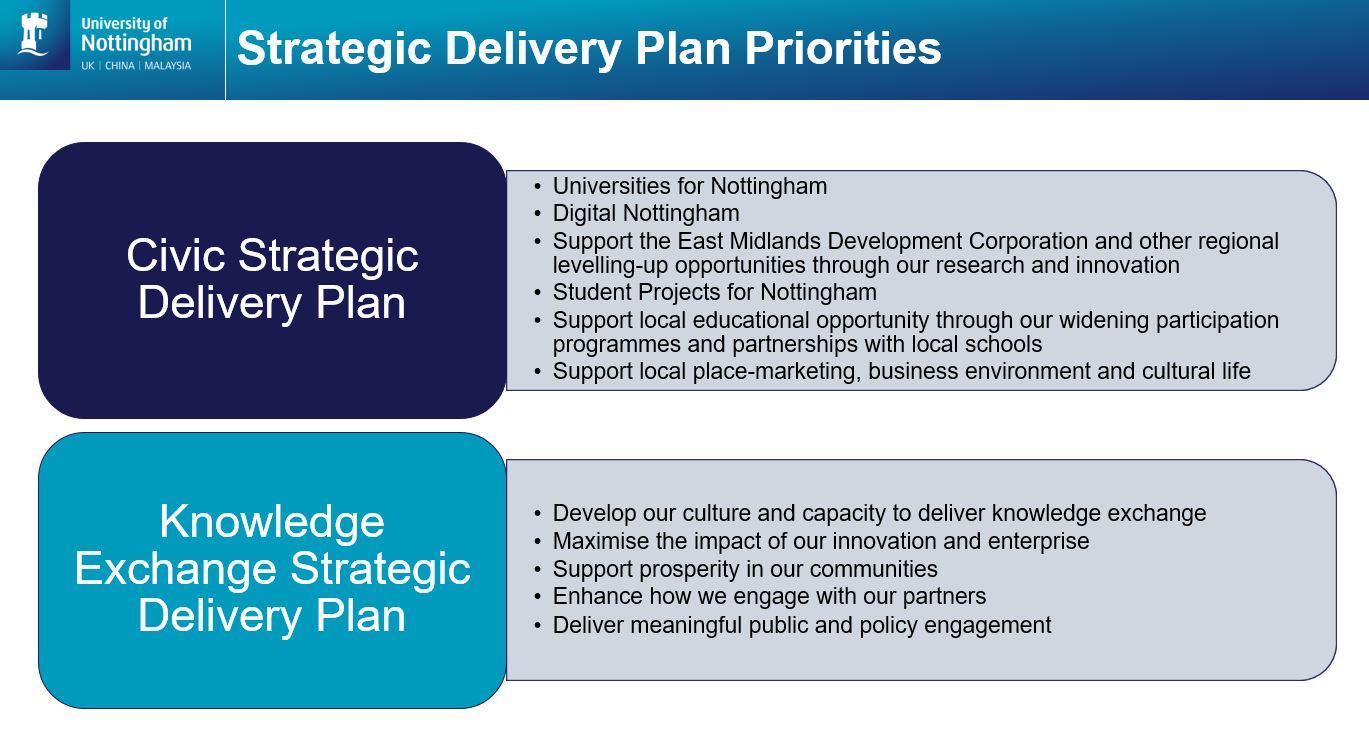
Figure 1
The delivery of our strategic priorities is guided and monitored by our Civic and Regional Committee, which has responsibility for our civic and regional engagement, and our Knowledge Exchange Committee (a committee of Senate), ensures the university is compliant with external knowledge exchange requirements and agrees on the allocation of resources. Both of these committees have reporting lines to the University Executive Board, our senior leadership team.
The university is a global research and teaching institution as well as being an anchor institution for Nottingham and the East Midlands region. We currently have over 45,000 students and 7,000 staff located across four UK and two international campuses, while we are also a major employer and generate over £760m per annum for the city economy. Our immediate geographical focus is to deliver impact within Nottingham and Nottinghamshire, while we also engage more widely at a regional, pan-regional and national and international level on strategic issues that require partnership working at larger scales (fig2).
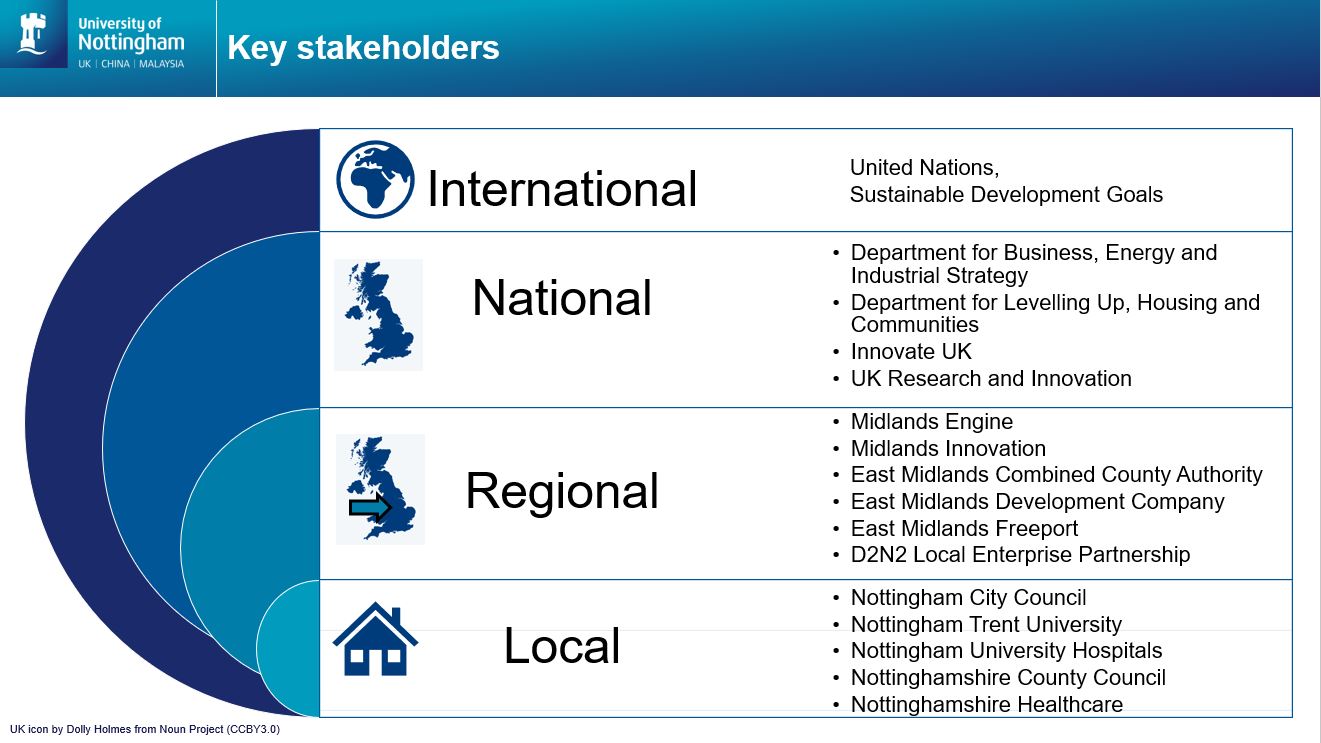
At a local level, our approach is focused on improving the lives of people in Nottingham and Nottinghamshire through the power of our research, knowledge and scholarship. Together with NTU, we have created the Universities for Nottingham (UfN) Civic Agreement, a pioneering collaboration with local partners aimed at improving levels of prosperity, opportunity, sustainability and health and wellbeing within our local communities. The Civic Agreement sets out five thematic priorities (fig3) where we will coordinate our activities with local partners to deliver positive change and impact across the city and county.
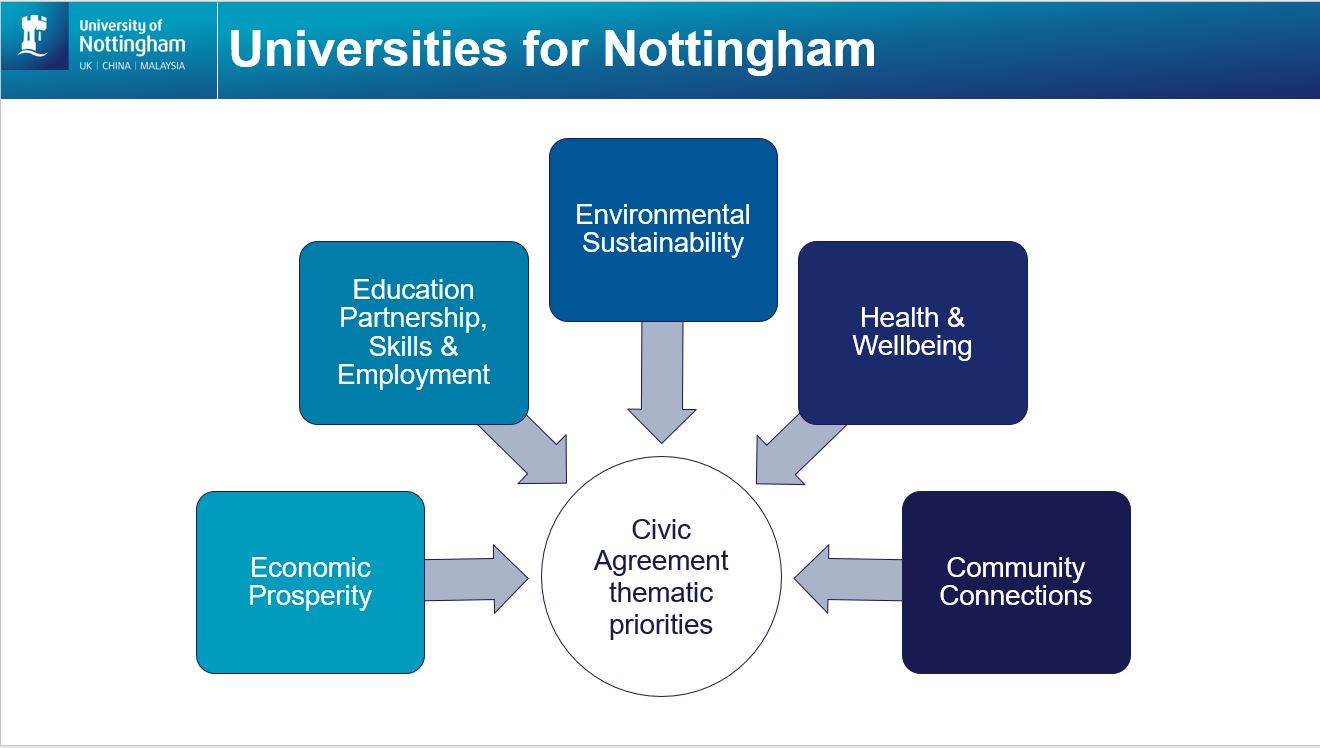
Figure 3
To understand the evolving needs of the local area, we engage with the leaders of both Nottingham City Council and Nottinghamshire County Council through a programme of quadrilateral meetings with NTU. We are also a member of the Nottingham Growth Board and have helped to shape the six major ambitions set out in the Nottingham Economic Recovery and Renewal Plan to reimagine the city as an inclusive, green, creative and digitally enabled place.
Beyond the city and county, we are part of the D2N2 Local Enterprise Partnership (LEP) and have played an active role in developing and delivering the LEP’s Recovery and Growth Strategy (fig4) to rebuild, grow and decarbonise the sub-regional economy. Our Vice-Chancellor was a member of the LEP Board and chair of the People and Skills Advisory Board from 2020 to 2022, overseeing the development of the first D2N2 Local Skills Report to inform and influence future skills provision.
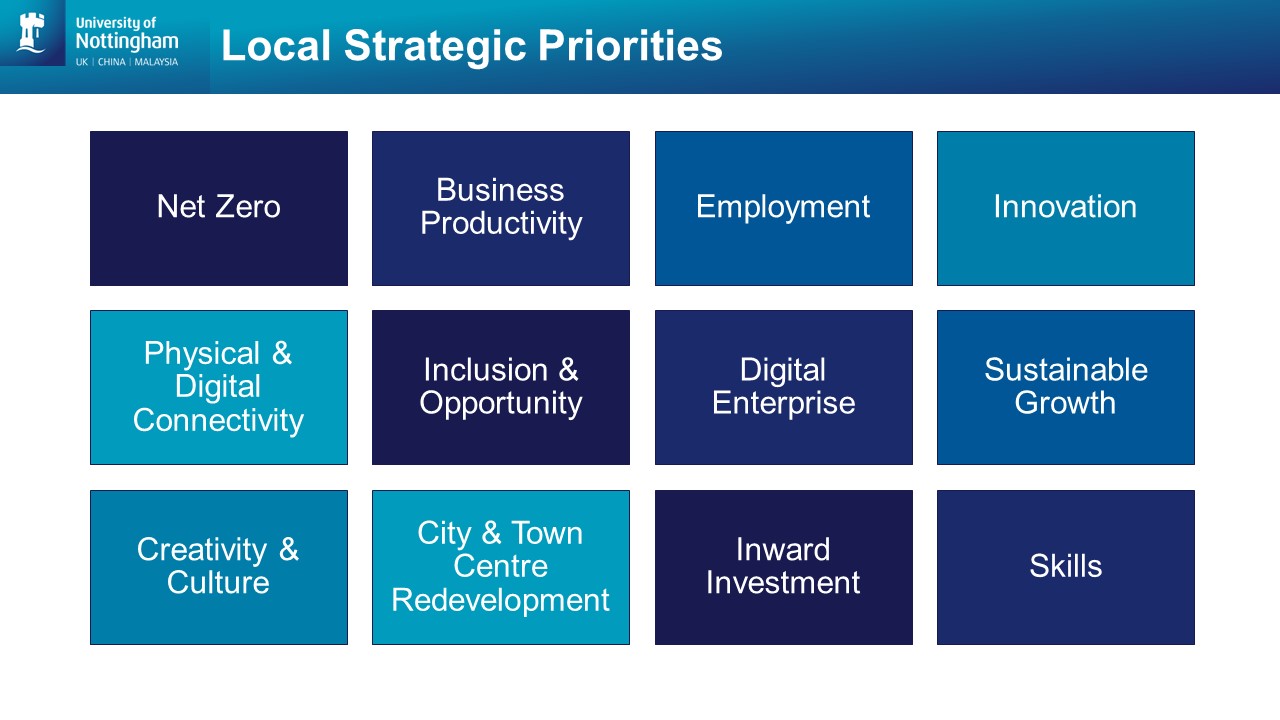
At a regional level, we are one of 20 Higher Education Institutions in the Midlands Engine partnership and are guided by the Midlands Engine Strategy and Vision for Growth. We are also one of eight research-intensive universities that together form Midlands Innovation. The aim of this partnership is to build global hubs of research and innovation excellence, ranging from energy and transportation to medical science, the arts and humanities.
At a national level, our approach has been steered by government policy such as the Industrial Strategy White Paper and more recently the Levelling Up White Paper. We support the delivery of the government’s Freeports policy to stimulate economic growth, innovation and regeneration and we are a partner in the new East Midlands Freeport. We have also contributed to the development of the East Midlands Devolution Deal and are supportive of the proposals to create an East Midlands Combined County Authority to devolve more national powers and funding to the region from 2024.
Aspect 2: Activity
To deliver against the five thematic priorities identified within the UfN Civic Agreement, we have undertaken a variety of different knowledge exchange and outreach activities to support our local businesses and communities. We have also invested in new facilities and equipment to support industry, such as our Power Electronics and Machines Centre, using funding provided through national programmes such as the Getting Building Fund.
The following projects and programmes are examples of how we have delivered activity against the 5 thematic priorities:
Economic Prosperity
To improve economic prosperity, we have developed and delivered six European Regional Development Fund (ERDF) projects that have provided support to small and medium-sized enterprises (SMEs) across the D2N2 LEP area to improve their productivity and capacity for innovation:
Almost £23m funding has been secured for these projects, which will continue to provide support and the delivery of knowledge exchange activity for local SMEs until the summer of 2023, including grants, consultancy, technical R&D and new product development.
Our flagship initiative is Productivity Through Innovation (PTI), a £7m collaborative project delivered in partnership with NTU and the University of Derby. From April 2019 to June 2023, the project places postgraduates within SMEs to work for up to 200 hours on improving their productivity. Following a diagnostic review of the client’s productivity levels and identification of issues, a bespoke package of support is developed that is implemented by a postgraduate working directly within the business with academic supervision. At the end of the placement the business is then reassessed to determine the impact of the support and its contribution to productivity improvements.
Education Partnership, Skills and Employment
To support education partnerships, skills and employment, we have worked with local businesses at both strategic and individual employee levels. Nottingham University Business School’s Executive Education team supports professional development and works with business leaders to achieve their strategic aims.
In partnership with Nottingham City Council, our Careers and Employability Service has delivered the Skills Access Hub, a £5.7m European Social Fund programme focused on helping SMEs in D2N2 to close skills gaps through training, recruitment, apprenticeships and placements. The project supports SMEs to access talent from across the university and local community, covering part-time work, internships, placements and graduate opportunities. We provide a range of support, including help drafting an engaging job description, opportunities to promote their organisation on campus, funded opportunities and access to online recruitment resources.
Environmental Sustainability
To support environmental sustainability in Nottingham, we have worked with the city council on the Trent Basin housing development and community energy scheme through several collaborative projects between 2013 and 2022. This has included the development of an urban solar farm (272KWp), Europe’s largest community energy battery (2.1MWh) and a hub with a digital representation of the development where residents and visitors can visualise energy flows.
Trent Basin’s active energy community of 76 energy-efficient dwellings will soon be joined by a further 100 homes and a school. The project is located in the 250-acre Waterside regeneration area along the banks of the River Trent, where several thousand homes, amenities and businesses may potentially join the community energy scheme.
Health and Wellbeing
The Centre for Healthcare Technologies (CHT) is a collaboration between UoN and Nottingham University Hospitals NHS Trust, established to bring together key stakeholders, capabilities and expertise to support the rapid translation of scientific discoveries into healthcare adoption. It is core to the UfN Civic Agreement as establishing the Nottinghamshire MedTech innovation cluster makes Nottingham and Nottinghamshire a leading destination in which to invest or establish new businesses in health and life sciences. The CHT has been a key driving force behind local partnership projects aimed at growing the life science/health technology sector, including working with Medilink Midlands to deliver the INSTILS project and cementing Nottingham’s reputation for medtech innovation through becoming a partner city with the Association of British HealthTech Industries. CHT has an excellent track record of supporting the pathway to clinical adoption and achieving commercial success.
Community Connections
Linguistic Profiling for Professionals (LiPP) support our communities and businesses by applying academic linguistics (the study of language and communication) to improve community services. LiPP offers a unique portfolio of workshops, consultancy, online courses and eye-tracking. We use our world-class research into how language is used in real-life work environments to improve communication. LiPP has a supported community-based services such as:
the language used in health consultations
communication strategies in public health promotional material
enhancing multi-agency working practices
enhancing diversity and inclusion practices
LiPP supports changes to policies and professional communication practices to improve the lives of underprivileged populations by combating discrimination, prejudice and bias. Local clients include Nottinghamshire Fire Service, Nottinghamshire Police, Nottingham Women’s Centre, Nottingham City Council, Browne Jacobson LLP and Experian, as well as many national and international organisations.
Aligned to the themes of the UfN Civic Agreement, we also collaborate with UfN signatory partners (fig5) and we are committed to delivering collective action. This has strengthened relationships with key local stakeholders and enhanced our ability to work together and speak with one voice (where it makes sense to do so, such as local regeneration priorities).
Details about our collective achievements can be found at www.universitiesfornottingham.ac.uk.
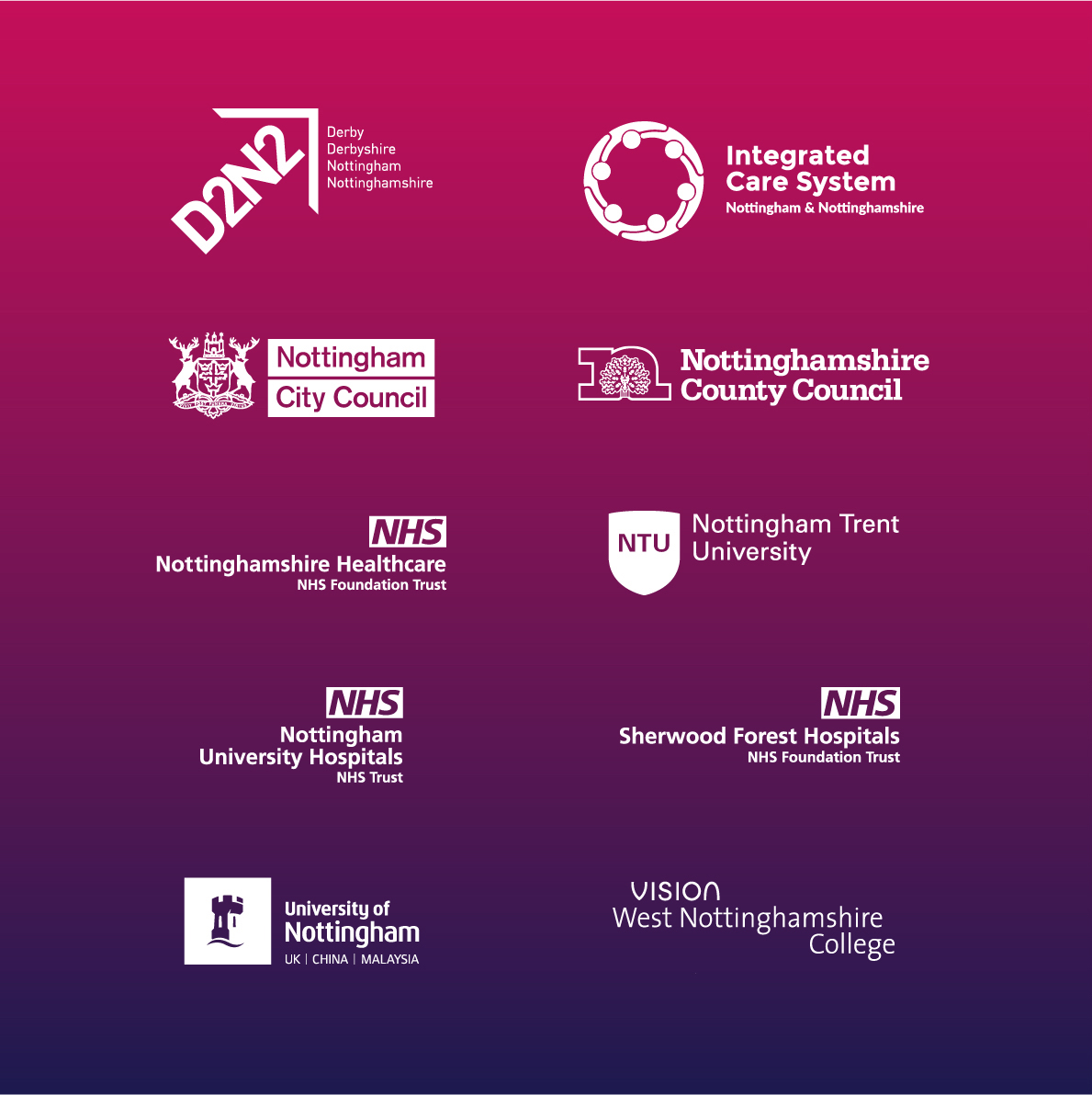
Figure 5
Additional strategic activity:
In 2021 we purchased Castle Meadow in Nottingham to develop a new city-centre campus. Castle Meadow Campus, opening in autumn 2023, will create a new innovation district in the heart of the city. It will bring together our university research and skills provision with industry. By expanding our current workspace offer at University of Nottingham Innovation Park, innovative businesses will have further opportunities to co-locate with us. The site will host the Nottingham University Business School and deliver CPD activity across a broad range of enterprise and innovation programmes. It will also create a collaborative hub in the city through Digital Nottingham, which brings together researchers, businesses and civic partners to innovate and create opportunities for growth and regeneration. Digital Nottingham will harness knowledge in areas such as robotics, immersive technology, financial technology and data science to build and support a thriving, skills-rich regional digital sector.
Aspect 3: Results
Through the UfN Civic Agreement five thematic priorities and their associated example activity outlined in Aspect 2, we have delivered the following outcomes and impacts during 2019-2022:
Economic Prosperity
We have worked with over 600 SMEs across the Midlands and undertake varied knowledge exchange projects. Our Productivity Through Innovation (PTI) team has delivered 53 placements, amounting to 10,500 hours of dedicated support from postgraduates and leveraging £1.3m of private sector investment. As well as helping host companies become more agile, productive and responsive to opportunities, the PTI programme has enriched the experience of postgraduate placement students by giving them insights into how innovation and the sharing of knowledge can address real-world challenges. Reported outcomes include:
“It has so far been a great experience of having students here at GBS. Not only are they gaining some valuable industry experience and exposure, but they also add creative value to the team.” Placement Host
“One of the best SME support programmes I have encountered. I would really encourage and absolutely recommend engaging with PTI.” Placement Host
“I learnt how to use new tech and have now devised a great career path.” Placement Student
“My placement turned into a full-time job offer.” Placement Student
Across all the ERDF projects we have reported the outcomes in fig6:
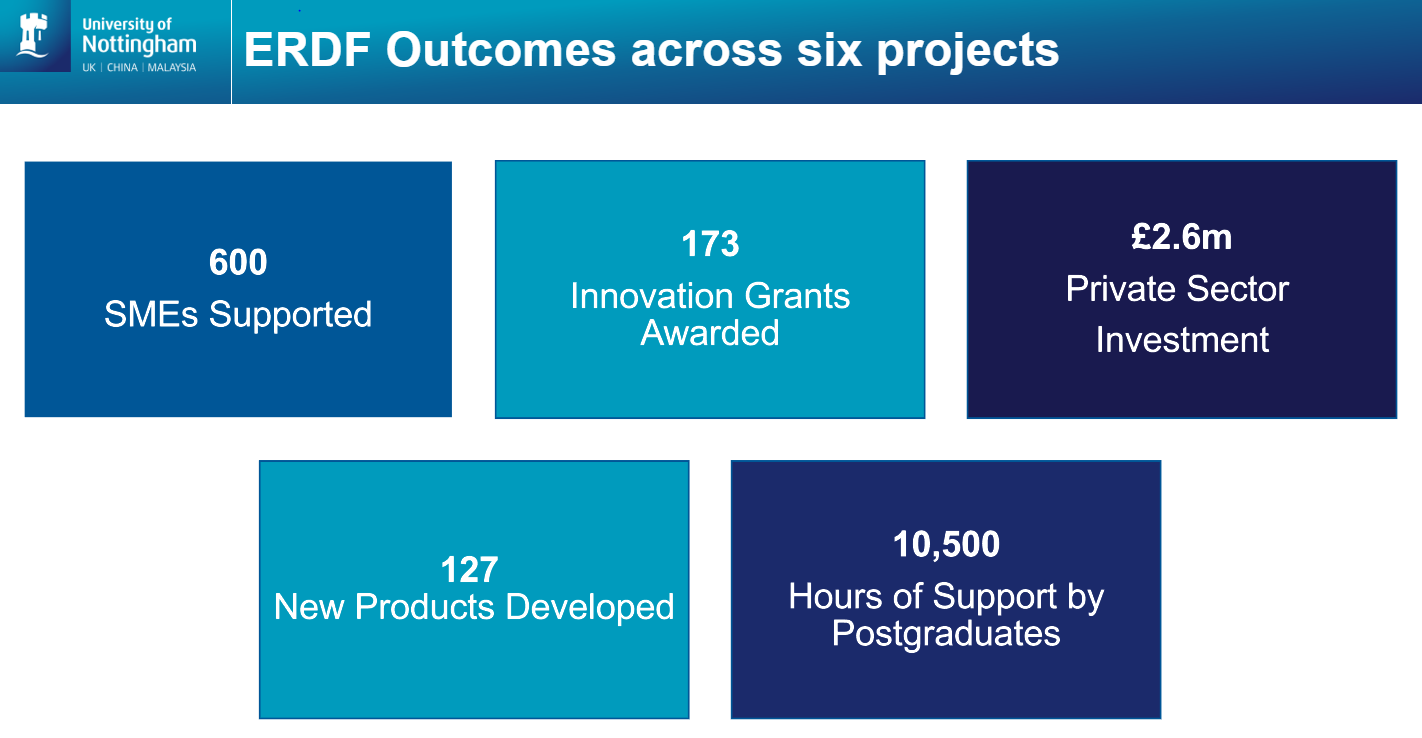
Figure 6
Education Partnership, Skills and Employment
The Skills Access Hub has engaged with 93 businesses, resulting in 207 employees taking part in training and 50 projects completed to date. Through the Skills Access Hub we have advertised 137 vacancies and successfully supported SMEs to hire 55 of our students and graduates. In addition, successful candidates have been drawn from Unitemps, our university-based recruitment agency, or from other local universities.
The impact of the programme is best expressed by one of its beneficiaries:
“The Skills Access Hub has made everything straightforward which has alleviated stress for us as a business. The support has been excellent! … from the initial set up of job adverts to claiming funding for a summer internship, and to have a graduate join our team. We have been really impressed and will not hesitate to contact them again.”
Environmental Sustainability
Data from 2019 showed that the Trent Basin Housing Development generated 152.5MWh of electricity through its solar panels and the energy generated onsite could supply 75% of community needs. Trent Basin can also store and supply power in response to national grid needs. In the same period its 2.10MWh community battery traded 273.9MWh of electricity with the grid, with profits covering capital costs and/or benefiting householders. Around 34 tonnes of CO2 equivalent are saved per year by green energy generation. The community energy project is influencing national and international policy and was heralded as an exemplar of environmental leadership at COP26, the UN’s climate change conference.
Health and Wellbeing
Researchers from the Centre for Healthcare Technologies (CHT) work with patient groups to ensure innovations are fit for purpose and enhance care.
More than 100 SMEs have been supported by INSTILS activities, which give access to grants for innovation development, plus expertise and advice from within the life sciences, business, NHS and university community. This includes:
Design and manufacture of medical devices
Rehabilitation technologies: supporting innovation in the East Midlands
Manufacturing and medtech
Biodiscovery Institute events
One-to-one KE support with academics wanting to explore their innovation potential.
These activities resulted in SMEs improving their competitive advantage through innovation and by stimulating interaction between businesses, research entities and the NHS. As an INSTILS partner, UoN has engaged with 104 businesses, delivering networking and technology awareness raising events as well as helping companies access grants for innovation support, medtech trials and networking.
In addition, CHT is a strategic partner in the delivery of the Medical Technologies Innovation Facility based at NTU, which offers a range of fully integrated services to help SMEs accelerate med-tech product development.
Community Connections
LiPP has worked with over 100 organisations during the KEF period delivering interventions based on changing the language of exclusion to improve diversity and inclusion in businesses and organisations, including SMEs and larger corporate organisations. A REF 2021 Impact Case Study, with NTU as a partner, describes how the language of misogyny is now recognised as a hate crime. Sue Fish OBE QPM, retired Chief Constable of Nottinghamshire Police stated, ‘[t]he research continues to inform the national campaign to make misogyny/gender a hate crime and to gain new advocates and supporters’, providing ‘the vital research base to enable cultural change’. Nottinghamshire was the first police force to class misogyny as a hate crime as a direct result of the work and now, a ground-breaking programme aimed at encouraging men and boys to stand up as allies to eradicate harassment is being rolled out across our area and beyond. This lead to a Times Higher Education Award in 2021 for UoN and NTU, showcasing the strength of the universities coming together as Universities for Nottingham to create stronger local communities.
Public & Community Engagement
Summary of approach
Excellent public engagement activity contributes to the University of Nottingham being a world-class, research-intensive university (seventh for research power in UK: REF 2021).
Our local civic engagement is ambitious. We signed the first Civic University Agreement with Nottingham Trent University and partners, creating Universities for Nottingham. We have launched ‘city as lab’ as the first stage of Digital Nottingham, an initiative that will sit at the heart of our new city centre campus.
Our national public engagement includes collaborations to co-produce solutions to challenges such as climate change, access to justice and future food systems.
We are internationally engaged, working with the United Nations, the European Union, other Inter-Governmental Organisations, States, Civil Society Organisations, including from the Global South.
Aspect 1: Strategy
Our strategic commitment to public engagement features in the University Strategy goal embedding collaboration in all we do, committing us to “[…] reaching out to our students, to our alumni and to our civic partners, industry, governments and citizens to ensure our research and education is developed in collaboration with our stakeholders and that we are recognised for the many benefits we provide to society.”
Our Civic Agreement, joint with Nottingham Trent University (NTU) and local partners, was signed in 2020 and refreshed in 2022. Our current Civic Strategic Delivery Plan was ratified by the Civic and Regional Committee in 2021. Six priorities provide a framework for both civic and public engagement, including Digital Nottingham, Widening Participation programmes and supporting Nottingham’s cultural life.
Key, innovative elements aligned to the plan include:
The Civic Doctoral Training Partnership developed with NTU - “Co(l)laboratory” – which engages partners and public in research design and delivery to address local issues, and includes citizen science.
The Universities for Nottingham Expert Advisory Panel, which convenes experts from across the two universities to help fill evidence gaps on key challenges. The panel met for the first time in 2022 to advise the Integrated Care Board on winter pressures.
Lakeside Arts (our public arts programme) acting as a core member of the Cultural Education Partnership for Nottingham.
Our approach is further articulated in our Knowledge Exchange Strategic Delivery Plan (priority 5 – “we will deliver meaningful policy and public engagement”) and in our internal Public Engagement Blueprint published in 2021.
Our governance (fig1) focuses on:
oversight – understanding and gathering data on what is being done
improvement – sharing best practice, fostering innovation, learning from others
strategy – identifying gaps and opportunities, aligning with university priorities

Figure 1
The academic responsible for public engagement is the Pro-Vice-Chancellor for Research and Knowledge Exchange. The Director of the Institute for Policy and Engagement (IPE) is the professional services lead. The PVC for Global Engagement is a member of the Institute Board. Each faculty has an academic lead for public engagement, who sits on the PE steering group and informs our strategic approach.
The IPE is charged with oversight and delivery of public engagement KPIs, acting as the point of contact for internal and external colleagues. Figure 2 shows how consultation feeds into decision-making, with recommendations presented to senior leads via IPE.
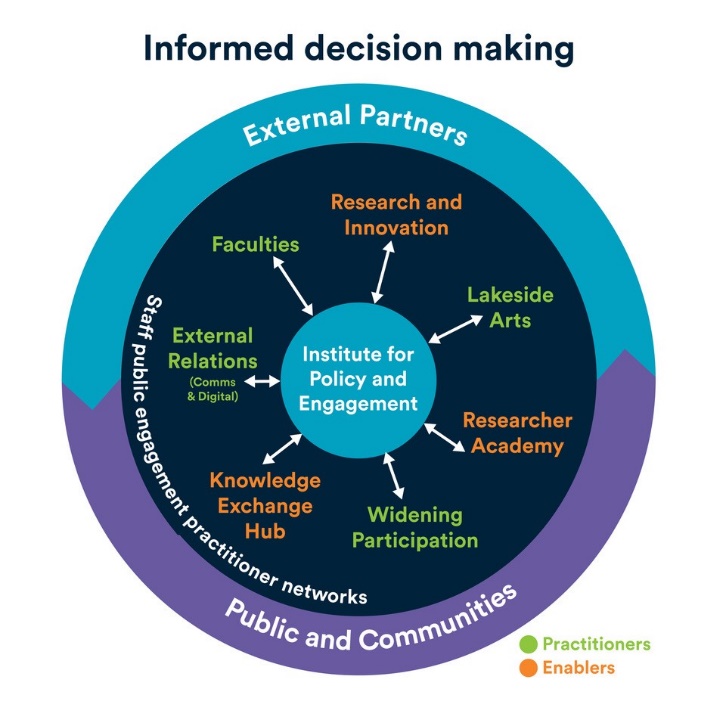
Figure 2
In the summer of 2022, IPE submitted a refreshed strategy to the University Executive Board. Subsequent approval allowed for a demonstratable shift towards delivery of our civic agenda, supporting the next generation of engaged academics and concentrating resources on research priorities.
Aspect 2: Support
Support
Key central roles to support PE are the Director of IPE, the Head of Public Engagement and the PE Project Manager. The KE Hub is supported by a Training and Development Manager. The Researcher Academy, which support post graduate and early career researchers, has a team member with responsibility for PE skills development.
Each faculty has a Head of Research and Knowledge Exchange, supported by two Knowledge Exchange and Impact Managers and academic leads for public and civic engagement. Medicine also has a Senior Patient and Public Involvement Manager post.
The Director of Lakeside Arts and Associate Director, Manuscripts and Special Collections have responsibility for public engagement.
The Widening Participation Team report to the Deputy Director of Student Recruitment.
Training
IPE public engagement staff trained 559 staff and students in 2021-22. Provision ranged from case study-based masterclasses and conferences to attending away days.
Specialist provision for PGRs and ECRs was provided by the Researcher Academy, media training was delivered by the media team and schools held sessions on knowledge exchange and hosted impact surgeries.
Resources are available on SharePoint sites and all training is evaluated to inform future learning.
Financial Resources
Our public arts centre, Lakeside Arts, has an annual budget of £1.2m and is equipped with public galleries, alongside performance and education spaces.
The IPE was established in 2018 and disseminates PE funding to researchers via our HEIF and Participatory Research allocations. For example, £142,987 was allocated via competitive call in 2021/22. We monitor applicant EDI and process reviews have been completed to promote better inclusion including shortening application forms, lengthening call timelines, more diverse panels.
Financial support for researchers’ activity can also be accessed via Impact Accelerator Accounts or Faculty RKE Committees.
Reward and Recognition
IPE organises annual awards which celebrate public engagement with research. These include the Rising Star for Public Engagement Award and the Best Public Engagement Initiative Award. These are open to our international campuses.
All staff can be nominated for the Nottingham Reward Scheme, which celebrates those who go above and beyond. The Vice Chancellor’s Medal is awarded for exceptional achievement.
Promotion criteria for academic staff, updated in 2021, now includes recognition of knowledge exchange activity.
Communications
An informal PE network, open to all disciplines and staff groups, is managed by IPE via channels including a mailing list and Microsoft Teams. The Practitioners of Outreach Group is aimed at STEM communicators and meets termly. More local groups include the School of Medicine PPI group, which offers peer support and implements internal processes.
IPE distribute a termly PE internal newsletter to share opportunities. The monthly Discover research e-newsletter reaches 7,000 staff and PGRs and includes updates on knowledge exchange.
Twitter accounts include @UoNresearch (7,355 followers) and @UoN_Institute (1,759), which share opportunities and celebrate best practice.
Aspect 3: Activity
This small selection of examples illustrates the range and strength of activity taking place across our university.
Examples from key research areas that demonstrate the reach of activity:
Ending modern slavery – The Rights Lab delivers research to help end the enslavement of 40 million people worldwide. An illustrative project is Survivor-led empowerment through ethical story-telling and participatory photography in Kenya, a collaboration between the Rights Lab, NGOs and the charity Worldreader.
Sustainable food systems – research delivered across all five faculties tackles the challenge of achieving global food security. Their extensive outreach programme included joining the Royal Society Summer Exhibition 2022.The exhibition attracted 5,700 visitors, with press coverage (for example BBC business news) reaching a global audience. Internationally, researchers have been working in Malawi on a range of projects, including one developing new stoves for clean cooking.
Net zero - Creating innovative solutions to achieve net zero is a university priority. Our COP 26 campaign shared our research with new audiences (see fig3).
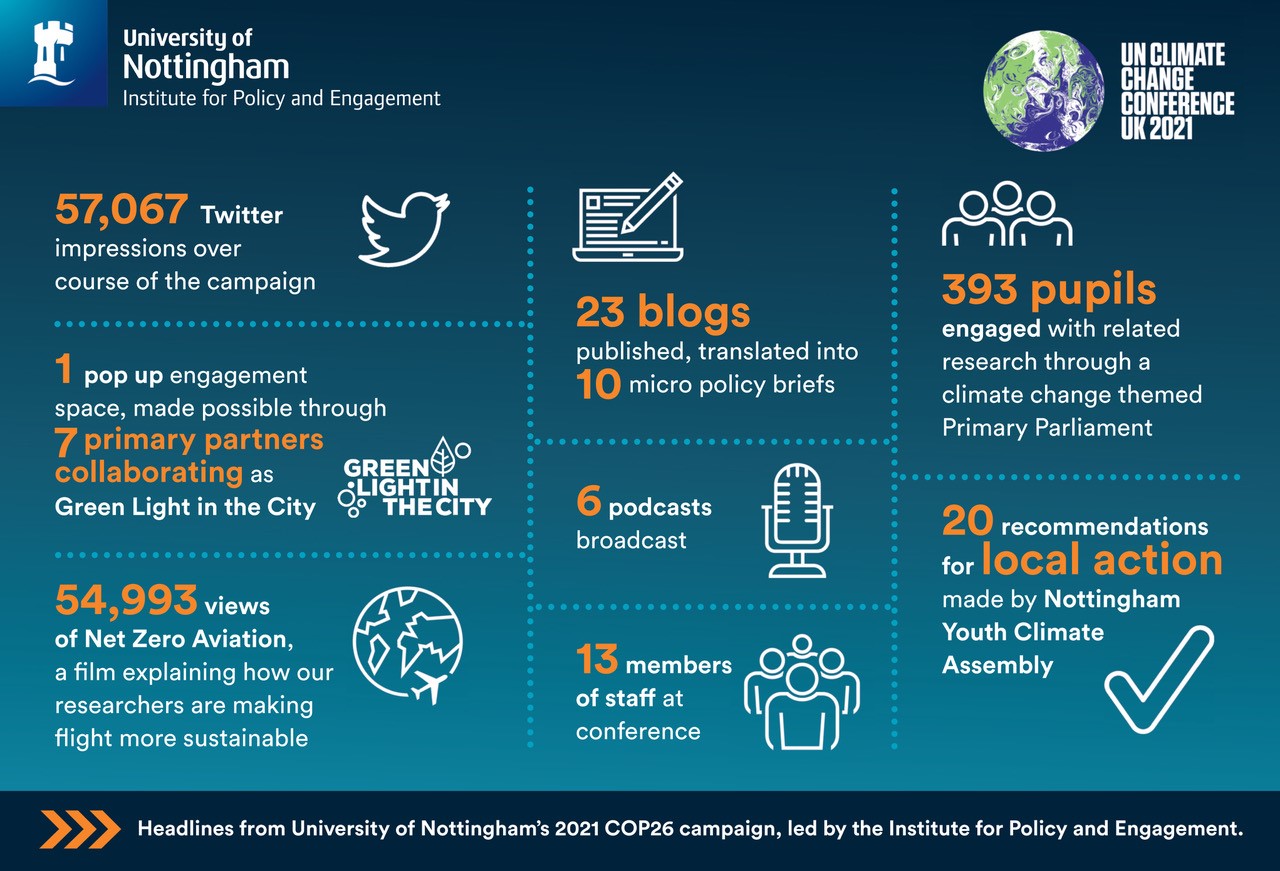
Figure 3
Commitment locally is illustrated through the Nottingham Carbon Neutral Housing: Cost vs Carbon Retrofit Roadmap project, where community engagement informs the decarbonisation of Nottingham’s homes. The younger generation were encouraged to think about sustainable living through the Home:Zero project, showcased and part-developed at Lakeside Arts.
Projects dedicated to the protection of the natural world include a collaboration with the Woodland Trust, with volunteers working to record and map ancient trees in England.
Examples for Equality, Diversity and Inclusion strategy for the reporting period:
Equality of Representation - In 2021 the Maternal Health and Wellbeing research group worked with its network and local community groups to create inclusive recruitment materials. This example (fig4) is typical of steps being taken to work with diverse communities.
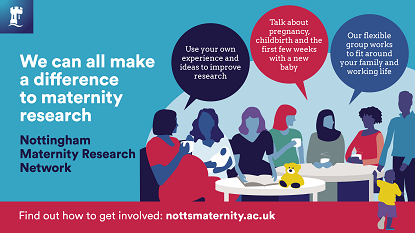
Figure 4
Equality of Opportunity – A Professor of Health Psychology is academic behaviour science lead on the NHS Blood and Transplant ‘For the Individual Assessment of Risk’ (FAIR) steering group, which has overseen changes to UK donor selection policy to enhance equality around sexuality and ethnicity.
Celebrating Diversity – We create events that showcase talent and encourage discourse, such as the Queer Chinese Art Festival.
Examples linked to our Civic strategy:
Universities for Nottingham (UfN) – Our large scale public events are increasingly produced in collaboration. Science in the Park is produced by both universities and held off campus, at Wollaton Hall. Numbers were restricted due to social distancing in 2022, but 856 people were able to get hands on with science (4,800 in 2020). Nottingham Festival of Science and Curiosity (FOSAC) comprised of 74 events in February 2022 and reached 5,483, Nottingham Soapbox Science returned in 2022 and reached 758 people. The learning programming at Nottingham Contemporary is supported by both local universities.
Supporting local educational opportunity through our widening participation programmes – from 2019-2022 there were 148,000 contact opportunities created for pupils in schools and on campus. Academics in education were key to the creation of Nottingham Education Sanctuary Team (NEST), a holistic educational provision for unaccompanied asylum seeker and refugee young people. This led on to the Art of Belonging project and exhibition, with New Art Exchange.
Supporting cultural life - Listening Posts installed in the council-owned Highfields Park, bordering our University Park Campus, feature audio recordings of researchers talking about their work and were accessed over 26,000 times by visitors in a year. The NOttFAR platform develops audiences for new music from the region. The heART project brought cell scientists into community venues and worked with a textile artist to interpret research.
Aspect 4: Enhancing practice
Our approach to monitoring, evaluating and enhancing practice in public and civic engagement goes beyond capturing standard metrics. At a university level, we capture and monitor data such as HEBCIS figures for PE participation, the number of academics engaging in PE and the number of organisations with whom we engage. The University’s Knowledge Exchange (KE) Strategic Delivery plan sets out ambitions and KPIs for public engagement alongside other aspects of KE.
High-level data only reveals so much about the quality, reach and impact of engagement. We also monitor individual projects as activities reaching relatively small audiences can have significant impact.
All public engagement projects funded by IPE, festivals we support or organise, or those receiving support from HEIF or Impact Accelerator Accounts are required to monitor data such as demographics and feedback. Evaluation determines if reach and impact objectives have been met.
Institution-wide public engagement festivals and events are managed by IPE and evaluation reports are completed using a template that details both positive and constructive feedback. These inform future practice and allocation of resources.
Detailed monitoring and evaluation is not required from public engagement events independently delivered by researchers. However, demonstrating impact is valuable and we offer support through our public engagement networks to encourage monitoring and evaluation.
The Institute use the NCCPE EDGE tool to help us reflect on practice and identify areas where further development is needed. This helps inform IPE KPIs and workload planning. Our evaluation also informs support, with us seeking feedback from focus groups of internal stakeholders when proposing new training offers.
Monitoring and documentation of impact was at the core of the public engagement-based case studies we submitted to the REF. Approximately 10% of our impact case studies had publicly engaged research as a key element, including:
Tackling the taboo and lack of awareness about menopause and work for midlife women
Safe space: protecting the rights of young people in the digital space
"Hungry for words": using narratives to transform how eating disorders in men and boys are understood
The macro and micro level data we gather inform and enhance our programmes of training and support, helping to identify gaps, communicate and incentivise innovation and best practice and design future funding calls. Intensive programmes, such as the ESRC-funded Impact Leaders, enable academics and third sector partners to co-produce project plans. We have developed peer learning networks for researchers and encourage honest reflection.
Aspect 5: Building on success
Continuous improvement is embedded in all our activity. A review by University Executive Board of the IPE recommended the Institute strengthen its alignment with the new University Strategy. This initiated a rethink of training and stronger collaborations with the Researcher Academy and the KE Hub, creating a more comprehensive package of support for researchers.
The IPE led on gaining leadership support for an application for a National Co-ordinating Centre for Public Engagement Watermark award to secure an external evaluation of our practice and insight into how we can further improve.
KPIs for public engagement are monitored by the Knowledge Exchange committee every quarter. Progress on the civic SDP is monitored by the Civic and Regional Committee.
IPE produce annual reports that are presented to these Committees, the IPE Board and Public Engagement Steering Group. The 2021-22 report showcases a move towards greater external partnership working, while continuing support of our researcher community. Oversight groups challenge us to go beyond ‘business as usual’.
Publics and communities have oversight of our activity through:
At a strategic level UfN leaders group has members from local councils and public services, who collectively agree priorities.
Work co-ordinated by IPE is overseen by the IPE Board, with external representation from cultural partners and a national charity. The PE steering group has representation from civic stakeholders.
The opening of new demonstrator spaces for collaboration with business and publics demonstrate our commitment to continuous improvement and growing opportunities to engage. Our Cobot Maker Space, a facility for human-robot interaction research, facilitates co-production of research with our partners. One of their research projects is working with local care homes to assist older people to co-design solutions to capture and preserve memories.
The pandemic spurred innovation in engagement, adding new channels and practices for reaching audiences. Our activity continued throughout lockdowns: our face-to-face lectures went online (the first online Science Public Lecture was May 2020); festivals found new vehicles (FOSAC partnered with Notts TV to create programming); Lakeside Arts joined forces with IPE to offer staff a training programme on engagement through digital media that created short videos.
Our work is informed by partnership working. We have deepened existing partnerships (for example, our relationship with IntoUniversity allows us to reach 4,000 additional young people a year) and reached out to new partners. To support Nottingham’s bid to be a UNICEF child friendly city, we worked with partners to investigate inclusive approaches to child involvement. For Green Light in the City, we worked with partners on a pop-up engagement space exploring environmental issues. This project was reported through creation of a toolkit. We have used our evaluations findings to improve our work and build on it.
Our schools and faculties are constantly evaluating practice and share insights. For example:
People with lived experience are routinely involved in research. Building on the success of trials such as the Cochrane Systematic review into treatment of vitiligo, led by a patient, we have launched a new NIHR-funded eczema citizen science project. Rapid Eczema Trials The co-lead on the project, working alongside the academic lead, helps run the Nottingham Support Group for Carers of Children with Eczema.
The Periodic Table YouTube channel, launched in 2008, has 1.58m subscribers and turned its creator, a UoN Professor of Chemistry, into a global figure. The professor was a driving force behind UNESCO adopting 2019 as the International Year of the Periodic Table. This science communication channel inspired another UoN YouTube success - Sixty Symbols (872,000 subscribers).
Note You are currently viewing the latest version of this narrative statement. View the previous version as published in previous iterations of the KEF (KEF1 and KEF2)